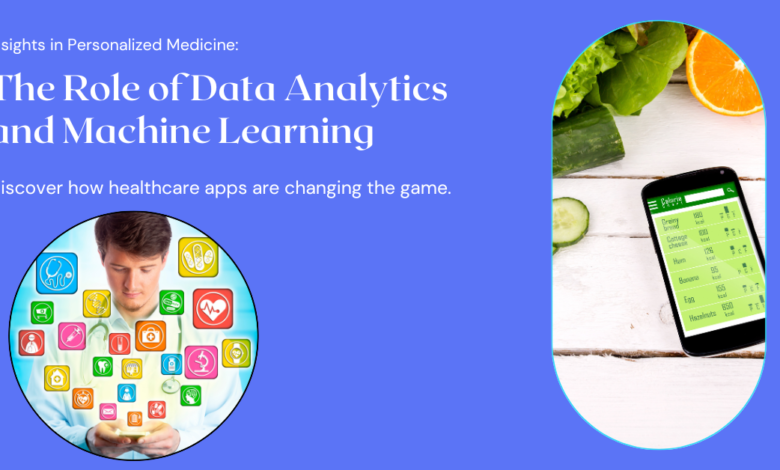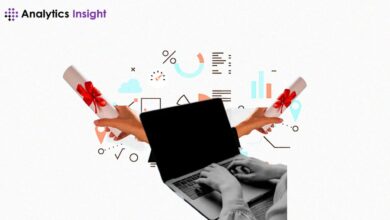The Role of Data Analytics and Machine Learning in Personalized Medicine Through Healthcare Apps | by Sefali Warner | Apr, 2024

Personalized medicine through data analytics and Machine Learning has revolutionized the healthcare industry by tailoring medical treatments to individual patients based on their unique characteristics. In recent years, Data analytics and ML apps have become powerful tools to facilitate patient engagement and self-monitoring. This article explores the role of data analytics and Machine Learning in personalized medicine through healthcare apps, highlighting their importance, benefits, challenges, ethical considerations, and prospects.
Personalized medicine is like having a tailor-made healthcare plan. It considers your unique genetic makeup, lifestyle, and environment to provide more precise and effective treatments. This approach aims to deliver targeted therapies based on individual characteristics.
Healthcare apps have revolutionized the way we access and manage our health information. From tracking our daily steps to monitoring our heart rate, these apps have become essential tools in our quest for better health. What used to be basic fitness trackers have now evolved into comprehensive platforms that can analyze a vast amount of data to offer personalized insights and recommendations.
The Role of Data in Personalized Medicine
Data is the fuel that powers personalized medicine. It provides the necessary information to understand patterns, risks, and potential treatments for individuals. By analyzing vast amounts of data, such as genomic information, medical histories, and lifestyle factors, healthcare professionals can identify personalized treatment options and interventions.
Benefits of Leveraging Data Analytics in Personalized Medicine
Data analytics opens a whole new world of possibilities in personalized medicine. It allows healthcare providers to identify trends and correlations that may go unnoticed. This means faster and more accurate diagnoses, more effective treatment plans, and ultimately better health outcomes for patients. Data analytics also enables continuous learning and improvement by constantly refining treatment strategies based on real-world evidence.
Machine Learning is like having a computer that can learn and make decisions on its own. It’s a branch of Artificial Intelligence (AI) that allows systems to analyze and interpret complex data patterns, discover insights, and make predictions or recommendations. In healthcare apps, Machine Learning algorithms can process large datasets and extract valuable information to enhance decision-making and improve patient outcomes.
Machine Learning algorithms can be embedded into healthcare apps, allowing them to continuously learn from user data and adapt their recommendations accordingly. For example, a fitness app can use Machine Learning to analyze a user’s exercise habits, heart rate, and sleep patterns to provide personalized exercise routines and sleep recommendations. By leveraging Machine Learning, healthcare apps can become intelligent and proactive health companions.
The combination of data analytics and Machine Learning offers significant advantages in personalized medicine.
1. Improving Data Visualization and Reporting
By combining the power of data analytics tools with Machine Learning algorithms, businesses can create visually engaging and interactive dashboards that present data in a way that is easy to digest and interpret.
2. Extracting Actionable Insights with Data Analytics and Machine Learning
With data analytics and ML, businesses can uncover valuable insights that drive informed decision-making and improve overall business performance.
3. Automating Data Processing and Analysis
Businesses can automate data processing and analysis processes by integrating data analytics and Machine Learning, saving valuable time and improving accuracy.
4. Reducing Errors and Bias through Machine Learning
ML algorithms analyze data objectively and make decisions based on patterns and statistical models, minimizing the impact of human subjectivity.
Ethical Implications of Data Analytics and Machine Learning in Healthcare
While data analytics and Machine Learning offer immense potential in healthcare, there are ethical considerations that need to be addressed. One concern is the potential bias in algorithms. If the data used to train Machine Learning models is biased, it can lead to biased treatment recommendations or diagnoses, disproportionately impacting certain groups of patients.
Another ethical concern is the transparency of algorithms. Patients and healthcare providers need to understand how algorithms arrive at their recommendations or diagnoses. Lack of transparency can undermine trust in the healthcare system and raise concerns about the accountability of algorithms.
Privacy Concerns and Safeguarding Patient Data
The use of data analytics and Machine Learning in healthcare apps necessitates the collection and analysis of personal health information. Privacy concerns arise as this sensitive data needs to be handled with the utmost care. Healthcare apps must employ robust security measures to safeguard patient data and comply with relevant privacy regulations.
Transparency in data usage and obtaining informed consent from patients is crucial. Patients should have control over how their data is used and be fully aware of the potential risks and benefits.
Emerging Trends in Data Analytics for Personalized Medicine
As data analytics continues to evolve, several emerging trends hold promise for personalized medicine. One such trend is the integration of data from wearables and Internet of Things (IoT) devices. This real-time data collection allows for more accurate monitoring of patient health and enables timely interventions.
Another trend is the use of Natural Language Processing in analyzing unstructured medical data, such as doctors’ notes or research papers. NLP algorithms can extract valuable insights from these vast amounts of text, aiding in personalized medicine research and decision-making.
Potential Breakthroughs in Machine Learning for Healthcare Apps
Machine Learning advancements are opening doors to exciting possibilities in healthcare apps. One breakthrough area is the use of deep learning algorithms. These sophisticated neural networks can process complex medical images, such as MRI scans or histopathology slides, with remarkable accuracy, assisting doctors in diagnosis and treatment planning.
Additionally, federated learning is gaining attention in healthcare. This approach allows Machine Learning models to be trained on decentralized data sources without sharing the raw data, preserving patient privacy while still benefiting from the collective knowledge present in diverse datasets.
Data analytics and Machine Learning have the potential to revolutionize personalized medicine through healthcare apps. Healthcare app development services from improving diagnosis accuracy to personalized treatment recommendations, these technologies offer valuable insights and benefits in healthcare.



